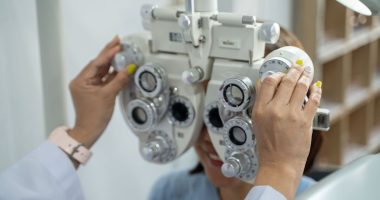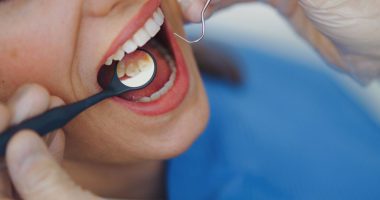Share this @internewscast.com
A little-known molecule in the body may be the key to treating aggressive cancer that often strikes young people, a study suggests.
Researchers in New York reviewed records from 11,000 cancer patients to evaluate long non-coding RNAs (lncRNAs), a type of RNA molecule that helps regulate gene behavior and distinguish healthy from non-healthy cells.
While studying human breast tumor models, they found a specific type of lncRNA called LINC01235, which has previously been linked to stomach cancer, may be feeding breast cancer cells.
The team tested their hypothesis using gene editing to ‘turn off’ LINC01235 in cells from triple-negative breast cancer (TNBC), an aggressive form of the disease that’s resistant to standard hormonal treatments.
They found cancer cells without LINC01235 grew more slowly and were worse at forming tumors than those with the activated molecule.
The experts, from Cold Spring Harbor Laboratory on Long Island, believe LINC01235 activates another gene called NFIB, which has been shown to increase the risk of triple-negative breast cancer.
NFIB then controls how cells grow and develop, leading to them becoming cancer cells. By turning off the molecule (LINC01235) that encourages the TNBC-linked gene (NFIB) to proliferate, researchers believe it could inhibit tumor growth and spread.
Study researcher David Spector believes the findings could also lead to new treatments for triple-negative breast cancer, which accounts for 10 to 15 percent of breast cancer diagnoses and disproportionately is diagnosed in young women.

Researchers in New York found a little-known molecule might lead to triple-negative breast cancer, which mostly affects young women (stock image)

Breanna Bortner, pictured here with her dog Mochi, was diagnosed at 30 with stage 2B triple-negative invasive ductal carcinoma, an aggressive form of breast cancer that starts in the milk ducts
He said: ‘Our long-term goal is to try to find an lncRNA or multiple lncRNAs that may eventually be therapeutic targets.’
Breast cancer is the most common cancer among women, affecting 316,000 per year and killing 42,000 in the US.
About to 10 to 15 percent of breast cancers are triple-negative, adding up to as many as 47,000 cases and 6,300 deaths.
Triple-negative means cancer cells don’t have receptors that respond to the hormones estrogen and progesterone and the protein HER-2.
Without these receptors, triple-negative breast cancers don’t respond to treatments that target those hormones, making them harder to treat.
Though the survival rate is over 90 percent if caught in earlier stages, those figures drop as low as 15 percent when the disease spreads to lymph nodes and other organs.
It’s most common in Black women and those under 40 and is one of the many forms of the disease on the rise, along with colon and lung cancers.
In the new study, published in Molecular Cancer Research, tumor samples were taken from breast cancer patients in New York and used to make organoids, small models of tumors. They were then compared to healthy tissue samples.

Holly McCabe was diagnosed with triple-negative breast cancer at 30 years old after finding a lump in her breast
The researchers found breast cancer tumors had significantly higher expressions of LINC01235 than healthy tissue.
LINC01235 was then deactivated with CRISPR, a type of gene editing that has mostly been tested in head, neck, gastrointestinal and brain cancers.
Since tumor growth slowed when researchers deactivated LINC01235, the team suspected the molecule increases the growth of breast cancer cells.
They suspected LINC01235 activates the gene NFIB, which has most often been tied to triple-negative breast cancer compared to other forms of breast cancer.
It’s believed NFIB suppresses the expression of p21, a protein that inhibits cell growth.
With this protein suppressed, cancer cells can grow unchecked.
Lead researcher Wenbo Xu, a graduate student at Stony Brook University, said: ‘Our findings demonstrate that LINC01235 positively regulates NFIB transcription.’
The team said the findings could be the first step in developing CRISPR technology to treat triple-negative breast cancer.
















